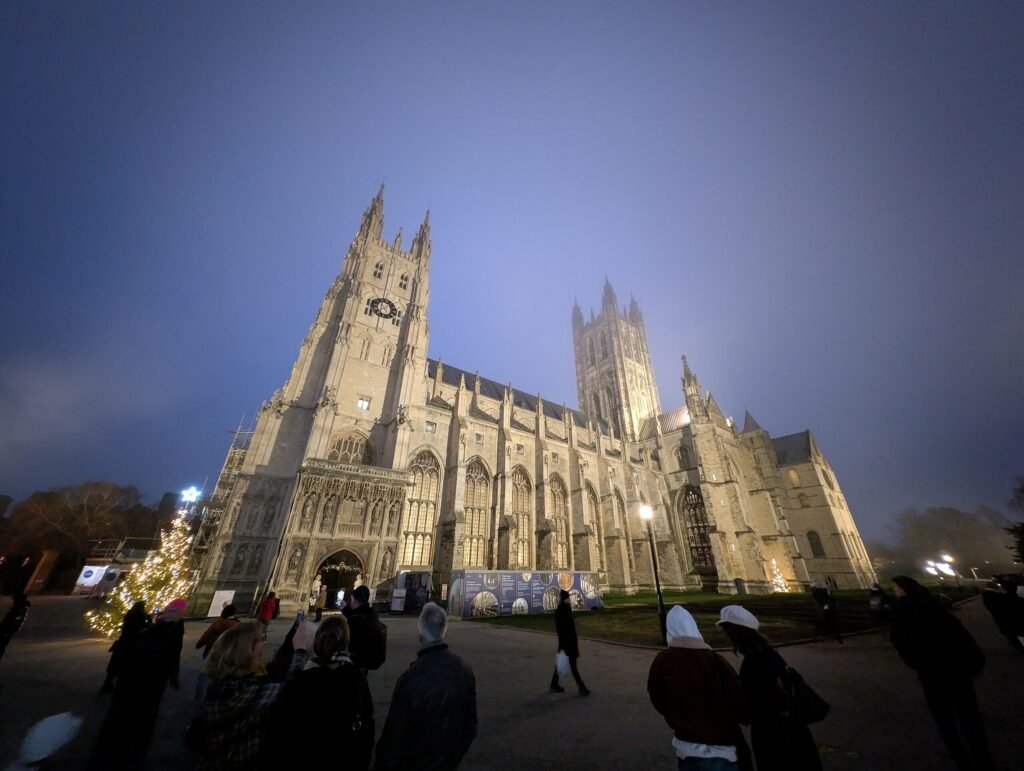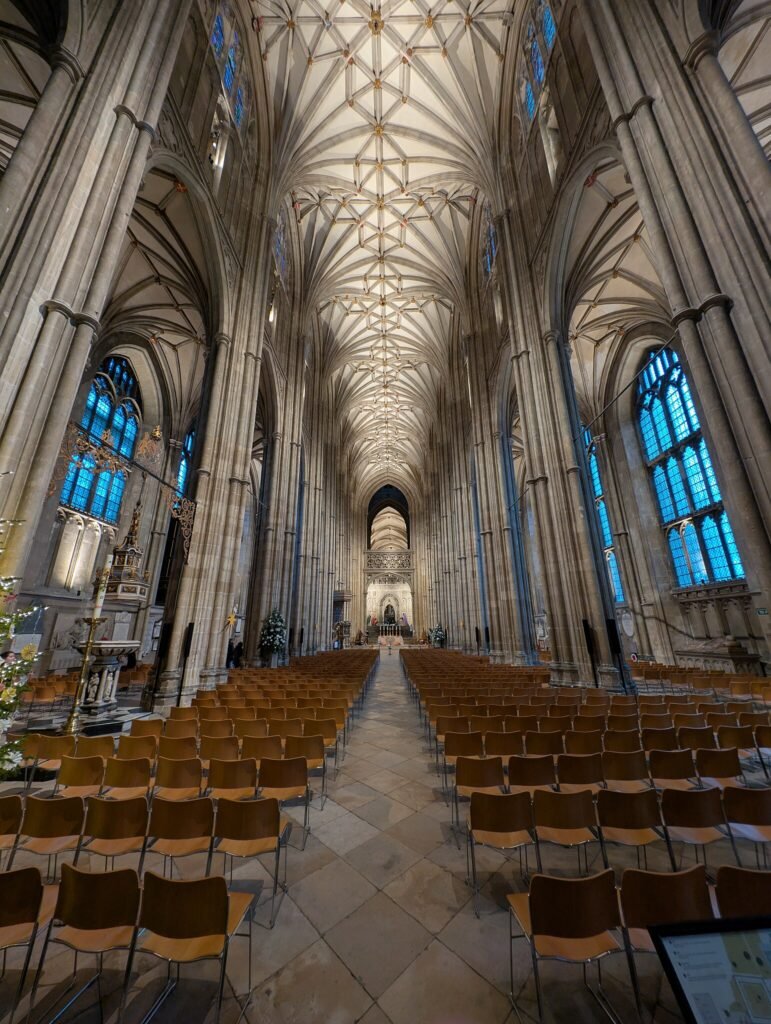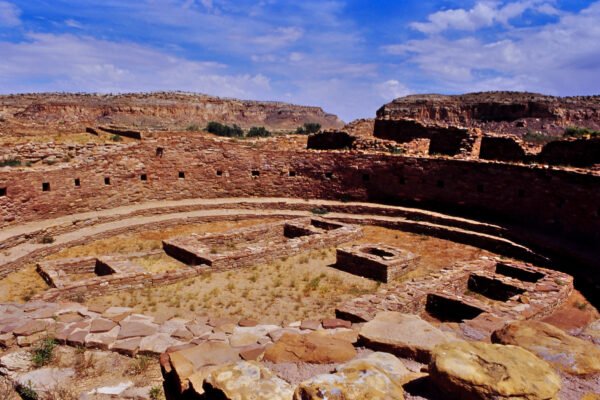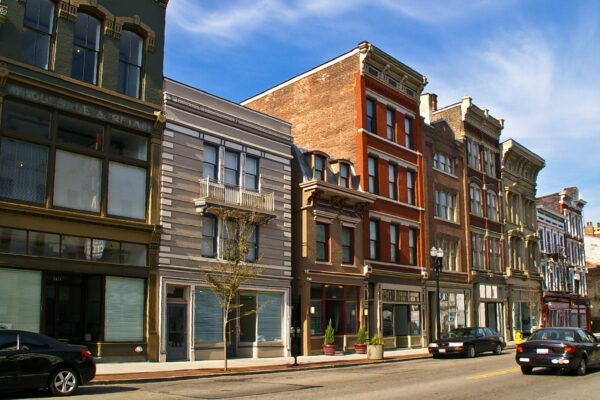The Iconic Canterbury Cathedral: Its History, Construction, and Visitor Essentials

Last month, we took a look at the history and legacy of Canterbury, England. It is only fitting that we devote a special article to Canterbury Cathedral, one of the most important religious sites in England.
The soaring spires of Canterbury Cathedral rise above the Kent skyline, a symbol of enduring faith and architectural genius that has stood for over 1,400 years. Founded in 597 CE by St. Augustine, it is the cradle of English Christianity. The cathedral evolved into a UNESCO World Heritage Site, renowned for its stunning mix of Romanesque and Gothic elements.
This article explores the cathedral’s rich history and construction milestones. It also provides practical guidance for those looking to visit this architectural and historical gem.
History and Construction of Canterbury Cathedral
Successive eras of building and rebuilding have layered the cathedral’s architectural splendor and historical depth. It is a testament to evolving styles and events in English history.
- The story begins in 597 CE. Pope Gregory the Great sent St. Augustine to England to establish Christianity. The initial structure Augustine built was modest, but it became the seat of the Archbishop of Canterbury. Following the Norman Conquest, a major change occurred. Between 1070 and 1077, Norman Archbishop Lanfranc led a complete rebuild. This introduced new Romanesque features, influenced by the era’s ecclesiastical architecture. These included robust arches and the notable crypt, which still exists today.
- The 12th century brought further expansions, largely driven by a disastrous fire in 1174 that destroyed much of the choir. This event prompted an innovative rebuilding of the east end and the addition of the Trinity Chapel. Architects William of Sens and William the Englishman introduced new Gothic elements. These features, such as pointed arches, ribbed vaults, and flying buttresses, marked the transition to the Early English Gothic style. A pivotal event was the 1170 martyrdom of Archbishop Thomas Becket. The Corona Chapel was added specifically to house his relics. This transformed the cathedral into a major European pilgrimage hub. The influx of pilgrims and wealth influenced further Gothic enhancements, including the intricate stained glass windows that depict biblical narratives.
- Later modifications continued to shape the building. The 15th century saw the addition of the Perpendicular Gothic central tower, known as Bell Harry Tower. Designed by John Wastell, it reaches 235 feet. This tower symbolizes the cathedral’s resilience through turbulent events, such as the Reformation. Henry VIII dissolved the monastery in 1538. The cathedral also endured World War II bombings, which required significant restorations. A common misconception is that the cathedral is purely Gothic. In reality, it is a mosaic of styles. Visitors can see Romanesque, Early Gothic, and Perpendicular styles, all resulting from centuries of continuous adaptation.
This rich historical fabric now welcomes contemporary explorers, blending a sacred legacy with accessible modern experiences.

Canterbury Cathedral Today: Information for Current Visitors
Canterbury Cathedral remains a living monument. It is open to all for worship, exploration, and reflection. Modern amenities ensure an enriching visit while preserving its ancient sanctity.
Opening Hours
Typical opening hours are Monday to Saturday from 10:00 to 17:00 (last admission 16:00). On Sundays, hours are 11:30 to 17:00, though the main cathedral church opens at 12:30. You should always check the official website for changes. Services, special events, or conservation work can alter these times. It is important to note that entry is free for those attending a service or wishing to pray in one of the chapels.
Admission Fees & Inclusions
Admission fees for adults range from £18.00 (October to March) to £21.00 (July to August weekends). A key benefit is that multi day tickets are valid for 365 days, allowing repeat visits. Entry is free for children under 18 (up to two per paying adult). Free entry also applies to UK benefit recipients, local students, and Cathedral Pass holders. Concessions are available for groups and members. You can book tickets online in advance or purchase them on site. Your ticket includes access to the cathedral precincts, the gardens, any running exhibitions, mini talks, and activity trails.
Tours, Facilities, & Accessibility
Regular expert led tours are available and can be booked upon arrival. Multimedia guides are also available for hire. The site includes an on site café, The Lounge, which is open from 10:00 to 16:00. There is also a shop. The cathedral has a dog friendly policy. Well behaved dogs on leads are allowed in most areas, but not on tours or during certain events. Assistance dogs are welcome everywhere. For accessibility, Blue Badge parking can be arranged in advance. Several public car parks are also nearby. The site is family oriented, offering kids’ trails and the free entry policy for children.
Special Events & Tips
Always check for special events. Examples include the “Making History: Church State and Conflict” exhibition, or seasonal highlights like the Poppy Fields light show and the Christmas Market. We recommend arriving early to make the most of your day. You can also sign up for the cathedral newsletter for updates. If you have specific questions, contact the visits team directly. Be aware of potential restrictions during services or that garden access may depend on the weather. The cathedral maintains a welcoming atmosphere for first time visitors, fostering personal discoveries amid its timeless wonders.
Further Readings & Resources
The following sources and links are accurate as of the publication date of this article.
- Official Canterbury Cathedral Website: https://www.canterbury-cathedral.org/
- UNESCO World Heritage Site for Canterbury Cathedral: https://whc.unesco.org/en/list/496/
You may also like
Archives
Calendar
| M | T | W | T | F | S | S |
|---|---|---|---|---|---|---|
| 1 | 2 | 3 | 4 | |||
| 5 | 6 | 7 | 8 | 9 | 10 | 11 |
| 12 | 13 | 14 | 15 | 16 | 17 | 18 |
| 19 | 20 | 21 | 22 | 23 | 24 | 25 |
| 26 | 27 | 28 | 29 | |||



Leave a Reply